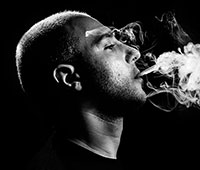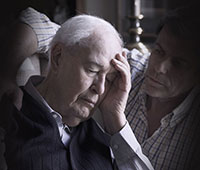WHAT IS Tobacco addiction
- Definition
- Causes
- Symptoms
- Diagnosis
- Ayurvedic Tips
- FAQS
- References
Definition

Tobacco addiction is an addiction to products containing tobacco and caused by dependence on the narcotic drug nicotine. 1
Nicotine is known to produce temporary pleasing effects on the body and brain. These effects further create a demand for more tobacco causing dependence. In case it is forcefully stopped, there are symptoms of withdrawal that cause irritation, stress and anxiety.1
Tobacco addiction and Ayurveda
Ancient Ayurvedic texts such as Sushrut Samhita and Vagbhat do not have any mention about tobacco. But another text Nighantu Ratnakar mentions the properties of tobacco. Tobacco is referred to as Tamrakoota.2
Ayurved describes tobacco as Pittal (increasing body heat), Ushna (hot), Teekshna (sharp), and mood elevating substance that leads to delusions when taken in large doses.2
Disclaimer: The information on this page is not intended to be a substitute for professional medical advice. Do not use this information to diagnose or ayurvedic treatment of psychiatry-mental-diseases and/or tobacco addiction without consulting the doctor. Consult your physician before beginning an exercise regime. "While we have products /ayurvedic medicines for psychiatry-mental-diseases and/or tobacco addiction, you must consult an authorized physician before taking any of the products. For more information on products, visit www.dabur.com or call 1800-103-1644"
Causes
Causes OF Tobacco addiction
While nicotine is the primary constituent that causes dependence, toxic effects of tobacco also occur due to other constituents of tobacco.1
Tobacco addiction has serious health implications as smoking regularly can increase your risk of heart disease, lung disease, teeth and gum disease, eye problems, pregnancy-related complications, stroke and cancer.1
Disclaimer: The information on this page is not intended to be a substitute for professional medical advice. Do not use this information to diagnose or ayurvedic treatment of psychiatry-mental-diseases and/or tobacco addiction without consulting the doctor. Consult your physician before beginning an exercise regime. "While we have products /ayurvedic medicines for psychiatry-mental-diseases and/or tobacco addiction, you must consult an authorized physician before taking any of the products. For more information on products, visit www.dabur.com or call 1800-103-1644"
Symptoms
Symptoms OF Tobacco addiction
Using tobacco in any amount and any form (cigarettes or chewing) causes nicotine dependence. Signs of addiction are as follows1:
- Unable to quit smoking or chewing tobacco
- Symptoms of withdrawal if try to quit
- Using tobacco in-spite of health problems
- Avoid places or occasions that require to not smoke
If the habit is not kicked, tobacco addiction can lead to serious health issues such as cardiac diseases, nervous disorders and even cancer1
Disclaimer: The information on this page is not intended to be a substitute for professional medical advice. Do not use this information to diagnose or ayurvedic treatment of psychiatry-mental-diseases and/or tobacco addiction without consulting the doctor. Consult your physician before beginning an exercise regime. "While we have products /ayurvedic medicines for psychiatry-mental-diseases and/or tobacco addiction, you must consult an authorized physician before taking any of the products. For more information on products, visit www.dabur.com or call 1800-103-1644"
Diagnosis
Diagnosis OF Tobacco addiction
Diagnosis of tobacco addiction is done as per the symptoms and behavior. By understanding the level of dependence, doctors can determine the optimal management plans.1
Disclaimer: The information on this page is not intended to be a substitute for professional medical advice. Do not use this information to diagnose or ayurvedic treatment of psychiatry-mental-diseases and/or tobacco addiction without consulting the doctor. Consult your physician before beginning an exercise regime. "While we have products /ayurvedic medicines for psychiatry-mental-diseases and/or tobacco addiction, you must consult an authorized physician before taking any of the products. For more information on products, visit www.dabur.com or call 1800-103-1644"
Ayurvedic Tips
Ayurvedic Tips Tobacco addiction
Diagnosis of tobacco addiction is done as per the symptoms and behavior. By understanding the level of dependence, doctors can determine the optimal management plans.1
Diet Recommendations (Aahar)
- Drink plenty of water as it helps in boosting metabolism and protecting your heart from various problems, including adverse effects of tobacco. Water should be stored in a copper container to keep it clean and free of harmful chemicals.3
- Consume natural herbs (medhya rasanayana) in your diet as they will help improve your will power towards quitting.3
Lifestyle changes (Vihar)
- Meditate twice a day to help refresh your mind and consciousness.
- Perform nasal cleaning (neti-kriya) in the morning and at night with normal saline solution at room temperature. It provides relief from sinus infections and allergy problems caused mainly from smoking. It is known to have not just physical, but also psychological and spiritual benefits.

- Regularly practice breathing exercise (Bhastrika Pranayama) at morning and at night as it will help expel harmful tobacco chemicals from your lungs and airways out of the body.
Disclaimer: The information on this page is not intended to be a substitute for professional medical advice. Do not use this information to diagnose or ayurvedic treatment of psychiatry-mental-diseases and/or tobacco addiction without consulting the doctor. Consult your physician before beginning an exercise regime. "While we have products /ayurvedic medicines for psychiatry-mental-diseases and/or tobacco addiction, you must consult an authorized physician before taking any of the products. For more information on products, visit www.dabur.com or call 1800-103-1644"
FAQS
FAQS
1. Why is stress bad for my health?
Stress symptoms can affect your body, your thoughts and feelings, and your behavior. If left unchecked, stress can contribute to many health problems, such as high blood pressure, heart disease, obesity and diabetes. Some of the common effect that stress can cause but we may not realize are -
- Headache,
- Muscle tension or pain
- Chest pain
- Fatigue
- Change in sex drive
- Stomach upset
- Sleep problems etc.
Hence it is very important that stress should not be ignored as a condition and immediate medical support should be sought for it.
2. What are the reasons for depression/How does depression happen?
There are no specific reasons that can lead to depression. Every person responds to any situation in different ways.
Yet, depression can happen to anyone and at any age, but often begins in adulthood. Depression is now being diagnosed in children and adolescents too. There are no specific risk factors, but following things increase the chances of someone to have depression -
- Personal or family history of depression
- Major life changes, trauma, or stress
- Certain physical illnesses and medications
3. What is addiction? How does it affect someone?
Addiction refers to the dependence on a legal or illegal drug, alcohol or medication. When addicted, people are not able to control their use of the substance, and may continue using the drug despite the harm it causes. Alcohol/drug addiction can cause serious, long-term consequences, including problems with physical and mental health, relationships, employment, and the law.
4. Why do I feel anxious without any apparent reason?
While the exact cause of generalized anxiety isn't fully understood, it's likely that a combination of several factors plays a role. Research has suggested that these may include over activity in areas of the brain involved in emotions and behavior or it may be genetic in origin. Often use of drugs, smoking or alcohol can be an underlying cause of anxiety.
However, many people develop anxiety for no apparent reason and it is therefore advisable to report it to the doctor and work towards managing the condition.
5. Do children suffer from depression?
While depression is generally associated with adults or senior citizens, it is not uncommon for children to be diagnosed with both depression and an anxiety disorder, or depression and general anxiety.
Children whose parents have depression are at a greater risk of being depressed. Depression in children often presents with irritability, difficulty sleeping or concentrating, Change in school grades, getting into trouble at school, or refusing to go to school, change in eating habits etc. These symptoms should not be ignored and possibility of depression in such children may be considered.
6. How is Bipolar disorder caused? Is it only genetic?
A lot of research in neuropsychology has shown that there is research has shown that there is no single cause responsible for BPD. Instead, it is likely that many factors contribute to the illness or increase risk. Genetics is just one of them.
While research suggests that people with certain genes are more likely to develop bipolar disorder than others, it is also seen that genes are not the only risk factor for bipolar disorder. Studies of identical twins have shown that even if one twin develops bipolar disorder, the other twin does not always develop the disorder, despite the fact that identical twins share all of the same genes.
7. Are phobias serious to a personal health?
Generally speaking, a ‘phobia’ is an overwhelming and unreasonable fear of an object or situation that poses little real danger but provokes anxiety and avoidance in the sufferer. Although many feel that phobias are harmless, they can be destructive to those who have them, causing the following problems that affect many aspects of life - such as social isolation, depression, lead to substance abuse, and may be the reason behind suicide too.
8. Are there any specific herbs that are specifically used to improve mental faculties?
Ayurvedic pharmacopoeia describes the various herbs and their qualities in details. Certain herbs belonging to the class of Medhya drugs such as Mandukaparni (Centella asiatica), Brahmi (Bacopa monnieri), Jatamansi (Nordostachys jatamansi) and Yastimadhu (Glycyrrhiza glabra) are considered amongst herbs that improve mental faculties and should be used often as a part of diet and lifestyle especially for children.
9. What are the common symptoms of dementia? Is any memory loss called Dementia?
Dementia is a syndrome (a group of related symptoms) associated with an ongoing decline of the brain and its abilities. A common symptom is memory loss but it is not the only symptom. Other problems can be low thinking speed, diminished mental agility, problems with language, understanding and judgement.
People with dementia can become apathetic or uninterested in their usual activities, and have problems controlling their emotions. They may also find social situations challenging, lose interest in socializing, and aspects of their personality may change.
10. I often forget things or important tasks. Do I have Alzheimer’s disease?
Occasional forgetfulness or missing things due to lack of concentration or time may not necessarily be a serious condition. But if you continuously forget things or tend to forget simple day to day tasks – this may be an indication of dementia or Alzheimer’s disease.
Any progressive memory loss should not be ignored and bought to medical attention, even if it seems negligible or not serious.
11. I had a road rage incident today, I feel nervous and afraid to ride on the road again. Why is this so?
It is natural to feel afraid during and after a traumatic situation. Fear triggers many split-second changes in the body to help defend against danger or to avoid it. This “fight-or-flight” response is a typical reaction meant to protect a person from harm. Nearly everyone will experience a range of reactions after trauma, yet most people recover from initial symptoms naturally. Those who continue to experience problems may be diagnosed with PTSD. Anyone can develop PTSD at any age. This includes war veterans, children, and people who have been through a physical or sexual assault, abuse, accident, disaster, or many other serious events. This needs to be bought to medical attention and can be managed with counseling and therapy.
12. What are the consequences of inattentiveness or weak memory of school children? Does this need to be cared for?
A weak memory leading to learning problems can have long term adverse social and economic outcomes. They include grade repetition, behavioral disorders, mood and self-esteem difficulties and school failure during the school years, and unemployment and poverty in adulthood. By using medhya rasayana, Ayurved promises improvement in working memory and improved grades ad performance among school children.
13. What is post partum depression? Does every new mother go through it?
New mothers generally report ‘baby blues’ immediately after childbirth, which commonly include mood swings, crying spells, anxiety and difficulty sleeping. These symptoms typically begin within the first two to three days after delivery, and may last for up to two weeks. But some mothers experience a more severe, long-lasting form of depression known as postpartum depression (PPD). Uncommonly, an extreme mood disorder called postpartum psychosis also may develop after childbirth.
Disclaimer: The information on this page is not intended to be a substitute for professional medical advice. Do not use this information to diagnose or ayurvedic treatment of psychiatry-mental-diseases and/or tobacco addiction without consulting the doctor. Consult your physician before beginning an exercise regime. "While we have products /ayurvedic medicines for psychiatry-mental-diseases and/or tobacco addiction, you must consult an authorized physician before taking any of the products. For more information on products, visit www.dabur.com or call 1800-103-1644"
References
References
- Charak Samhita of Agnivesha. Vidhyotini Hindi Vyakhya- Sastry K & Chaturvedi G – Editors. Chaukhambha Bharati Academy, Varanasi 221001. Reprint 2011
- Kulkarni AV. Tobacco and Smoking. Available at http://ayurved-for-cancer.org/in/download-section/tobaccoandsmoking.pdf accessed Aug 28th 2016
- Semwal DK, Mishra SP et al. Adverse Health Effects of Tobacco and Role of Ayurveda in their Reduction. J Med Sci. 2015; 15: 139-146.
- Dabur: Ayurvedic products and drugs. Available at http://www.daburmediclub.com/product.aspx accessed on Aug 19th 2016.
Disclaimer: The information on this page is not intended to be a substitute for professional medical advice. Do not use this information to diagnose or ayurvedic treatment of psychiatry-mental-diseases and/or tobacco addiction without consulting the doctor. Consult your physician before beginning an exercise regime. "While we have products /ayurvedic medicines for psychiatry-mental-diseases and/or tobacco addiction, you must consult an authorized physician before taking any of the products. For more information on products, visit www.dabur.com or call 1800-103-1644"
Know more on Psychiatry/Mental diseases




